Andrew Vine: Enigma and the secret war for democracy


Today’s threat, or the atrocity being planned for tomorrow, is uppermost in the minds of the security services as they try to disrupt the plotters, in the hope of preventing another September 11 or a repeat of the attacks on London, Paris or Brussels.
Yet perhaps yesterday, some of the officers who man the listening posts and monitor emails, paused and cast their minds back 75 years to a milestone in intelligence-gathering.
Advertisement
Hide AdAdvertisement
Hide AdIt was on May 9, 1941, that a young naval officer captured a German Enigma machine and codebooks that enabled Britain to decipher enemy messages. George VI noted that it was the single most important incident of the war at sea.
Lives were saved, and the war arguably shortened. The codebreakers of Bletchley Park got to work and the whole German intelligence operation was unravelled.
It was more than 30 years later, in the 1970s, before the cloak of secrecy began to lift. Suddenly, a whole new perspective on how the war was won opened up, as British intelligence revealed one of its greatest secrets and most notable triumphs.
The story of how it happened might have come straight out of a Boys’ Own adventure. It played out aboard a crippled German submarine rolling in a heavy Atlantic swell 400 miles off Iceland, forced to the surface by Royal Navy depth charges after it had torpedoed and sunk two British merchant vessels.
Advertisement
Hide AdAdvertisement
Hide AdInstead of sinking the submarine immediately, the commander of one of the three warships surrounding it decided it should be searched. The task fell to a 19-year-old sub-lieutenant, David Balme, who led a search party aboard, not knowing if it had been booby-trapped, or was filling with gas from its batteries.
A nerve-racking six hours followed, in which the search party worried constantly that the submarine, already stern-down, would sink.
They searched every inch, and then, in the radio room, a machine that resembled a typewriter was found, except when its keys were pressed, lights illuminated.
Lt Balme realised it was some sort of signals equipment, a conviction strengthened when he discovered a code book in the captain’s cabin. It took more than an hour to manoeuvre the bulky machine out of the submarine’s conning tower. Lt Balme also took the U-boat captain’s binoculars with him.
Advertisement
Hide AdAdvertisement
Hide AdBletchley Park already had one Enigma machine, but the capture of a second with a codebook enabled them to crack the German codes more effectively, and the immediate consequence was to save lives in the Atlantic by being able to anticipate the movements of U-boats.
Mr Balme was awarded the Distinguished Service Cross, though the honour was kept secret. He died aged 95 in January, having held his silence for decades, and deflecting questions about where he had found the swastika-emblazoned binoculars he kept aboard his yacht in Hampshire. Only when the Bletchley Park story emerged did he speak about his part in it, and then with a modesty that downplayed his role .
There’s every likelihood of another David Balme existing somewhere within our intelligence services today, a sharp and resourceful officer who spots something amid a mass of detail.
We might never know their identity, or have to wait for decades before what they did is revealed, but the secret war they are fighting is as vital now as it was in the dark days of 1941.
Advertisement
Hide AdAdvertisement
Hide AdIt won’t be a bulky piece of machinery that they spot now, but an email or an intercepted phone call. Even so, the intelligence-gathering of 2016 would, in its fundamentals, be recognised by the veterans of Bletchley Park.
The betrayal by the misguided and foolish American defence contractor Edward Snowden has undoubtedly hampered the fight against the enemies of our civilised democracies.
His leaking of information has aided nobody but the enemies of democracy, and only make our efforts to remain safe that much more difficult. Happily, Snowden’s disgraceful behaviour is an aberration. Our intelligence services are much more akin to the spirit of David Balme, and if they reflect on what he did 75 years ago, they might recognise that the courage, perseverance, and yes, luck, of that day in 1941 remain vital to winning the secret war of today.